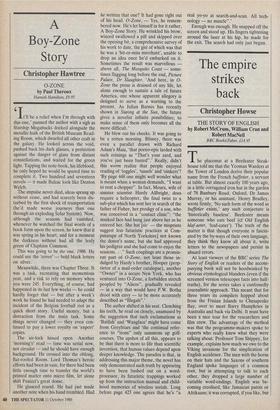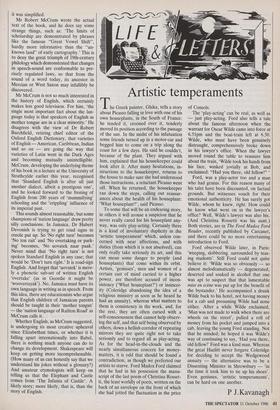The empire strikes back
Christopher Howse
THE STORY OF ENGLISH by Robert McCrum, William Cran and Robert MacNeil
BBC Books/Faber, £14.95
The placemat at a Beefeater Steak- house told me that the Yeoman Warders at the Tower of London derive their popular name from the French buffetier, a servant at table. But almost exactly 100 years ago, in a little corrugated iron but in the garden of 78 Banbury Road, Oxford, Dr James Murray, or his assistant, Henry Bradley, wrote firmly, 'No such form of the word as buffetier exists,' any such conjecture is `historically baseless'. Beefeater means someone who eats beef (cf Old English hlaf-aeter, loaf-eater'). The truth of the matter is that though everyone is fascin- ated by the by-ways of their own language, they think they know all about it, write letters to the newspapers and persist in absurd errors.
At least viewers of the BBC series The Story of English or readers of the accom- panying book will not be hoodwinked by obvious etymological blunders (even if the screened version telescopes facts into half- truths),, for the series takes a confessedly journalistic approach. This meant that for three years its compilers hopped about from the Frisian Islands to Chesapeake Bay, over to meet Barry Humphries in Australia and back via Delhi. It must have been a nice tour for the researchers and film crew. The advantage of the method was that the programme-makers spoke to experts who really knew what they were talking about. Professor Tom Shippey, for example, explains how much we owe to the Viking invasions for the simplication of English accidence. The men with the horns on their hats and the Saxons of southern England spoke languages of a common root, but in attempting to talk to each other, they dropped a large number of variable word-endings. English was be- coming creolised, like Jamaican patois or Afrikaans; it was corrupted, if you like, but it was simplified.
Mr Robert McCrum wrote the actual text of the book, and he does say some strange things, such as: 'The limits of scholarship are demonstrated by phrases like the famous "Great Vowel Shift", hardly more informative than the "un- known land" of early cartography.' This is to deny the great triumph of 19th-century philology which demonstrated that changes in speech-sound are conformable to pre- cisely regulated laws, so that from the sound of a word today, its ancestor in Mercian or West Saxon may infallibly be discovered.
Mr McCrum is not so much interested in the history of English, which certainly makes less good television. For him, `the single most important fact about the lan- guage today is that speakers of English as mother tongue are in a clear minority.' He disagrees with the view of Dr Robert Burchfield, retiring chief editor of the Oxford English Dictionary, that varieties of English — American, Caribbean, Indian and so on — are going the way that varieties of Latin went in the Dark Ages and becoming mutually unintelligible. McCrum, developing the underlying theme of his book in a lecture at the University of Strathcylde earlier this year, recognised that `Standard English is after all just another dialect, albeit a prestigous one', and he looked forward to the freeing of English from 200 years of 'mummifying' schooling and the 'crippling' influence of its imperial past.
This sounds almost reasonable, but some champions of `nation language' draw pretty silly conclusions. In Jamaica, Dr Hubert Devonish is trying to get road signs in creole put up. So `No right turn' becomes `No ton rait' and `No overtaking or park- ing' becomes, `No uovatek naar paak.' Never mind that `No right turn' is not spoken Standard English in any case; that would be 'Don't turn right.' It is road-sign English. And forget that `uovatek' is mere- ly a phonetic sub-set of written English `overtake' (as in Geordie it might be `woovertayale). No, Jamaica must have its own language in writing as in speech. From this idea, there are educationists who argue that English children of Jamaican parents should be taught in their `mother tongue' — the `nation language of Railton Road' as McCrum calls it.
Whether English, as McCrum suggested, is undergoing its most creative upheaval since Elizabethan times, or whether it is falling apart internationally into Babel, there is nothing much anyone can do to change its development. Shakespeare will keep on getting more incomprehensible. (How many of us can honestly say that we understand his jokes without a glossary?) And amateur etymologists will keep on telling us that the Elephant and Castle comes from `The Infanta of Castile'. A likely story; more likely, that is, than the story of English.



























































 Previous page
Previous page